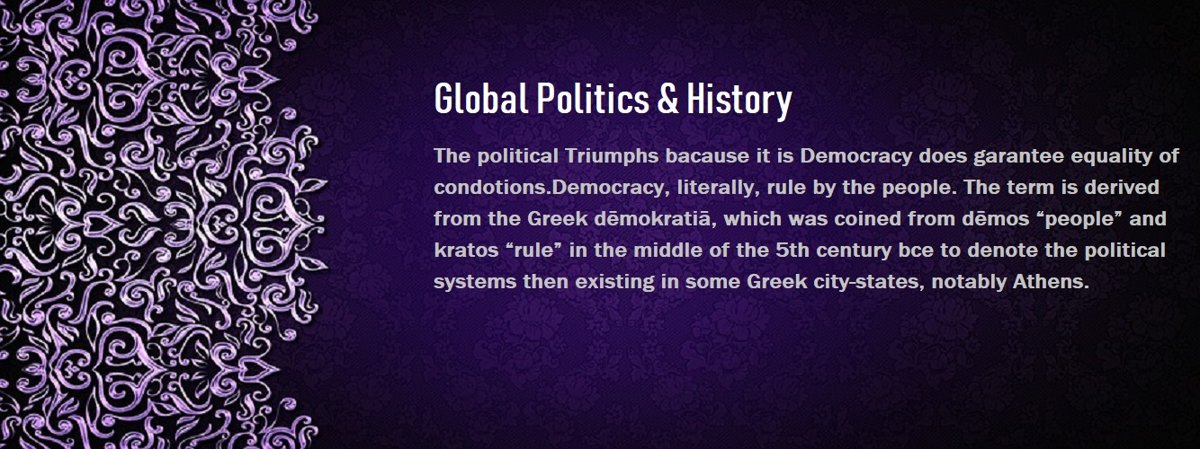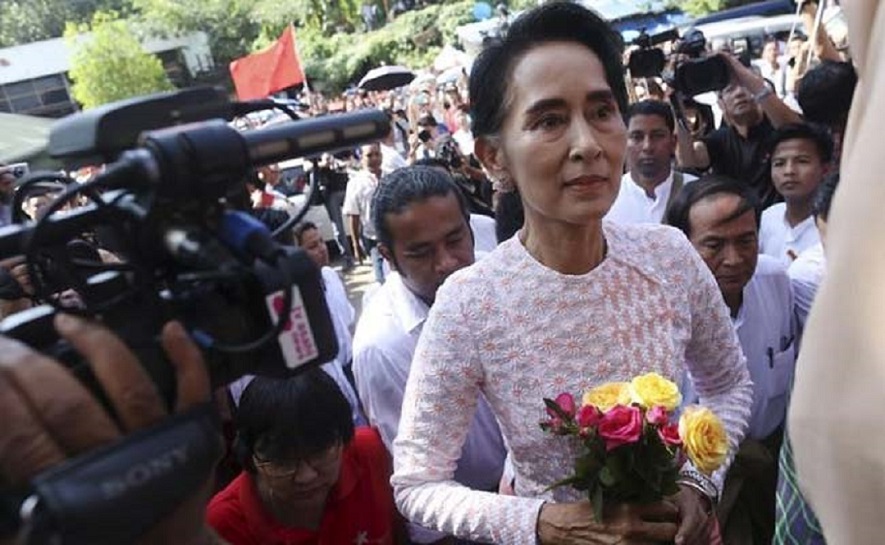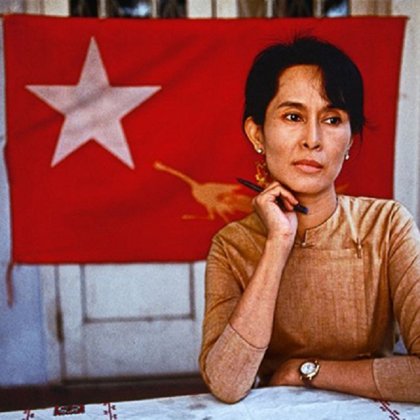AUNG SAN SUU KYI, - THE BURMESE DISSIDENT,MYANMAR'S PRO DEMOCRACY LEADER AND NOBEL PEACE PRICE PRIZE WINNER.SHE WAS DETAINED BY BURMA'S MILITARY AUTHORITIES AND 21 YEARS UNDER HOUSE ARREST.
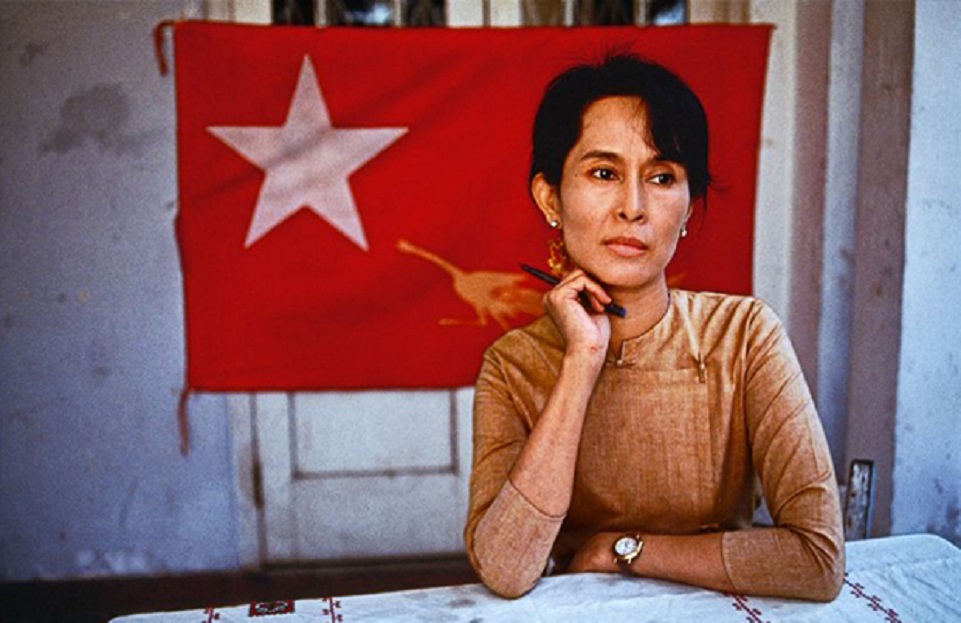
Aung San Suu Kyi was inspired by her father, Aung San, the leader in Burma's struggle for liberation from British rule.She was inspired by the non-violent approach of Mohandas Gandhi, who she learned about while her mother was ambassador to India. Aung San Suu Kyi moved there with her mother when she was 15.The woman who challenged one of the world's most repressive military regimes stands only five-foot-four inches and weighs only 100 pounds. She usually appears in public with flowers pinned behind her ears, adding to her appeal. But her petite appearance and gentle manners take nothing away from her tremendous conviction.
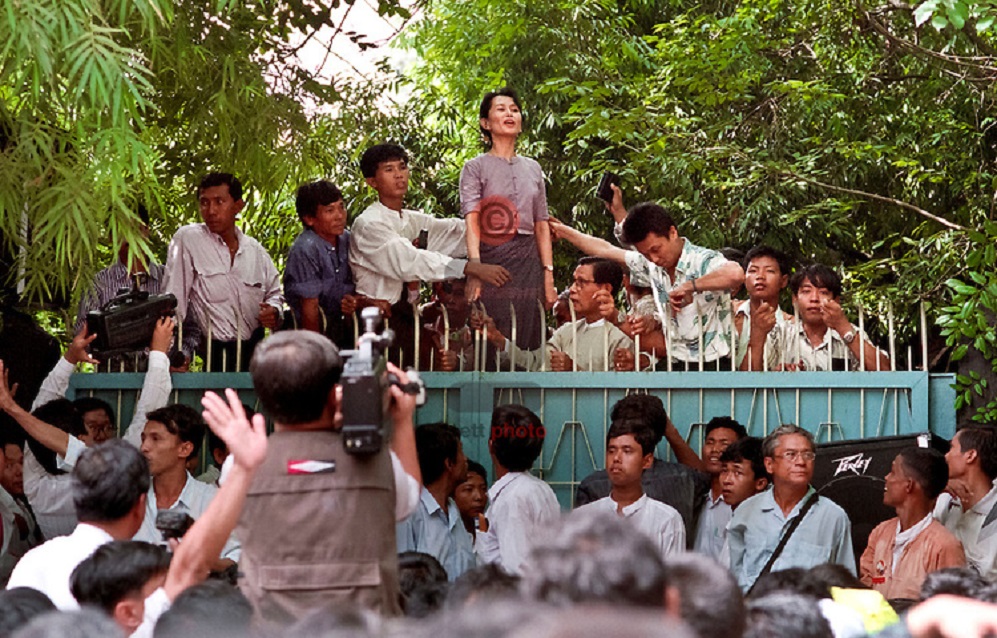 It would be good to think that her 15 years under house arrest have had a positive influence on the way Burma is governed. It is a great personal triumph that she has stuck to it, an extraordinary feat of willpower. But her release follows fraudulent elections that resulted in a political party closely linked to the military regime winning most of the seats in parliament, so it is questionable whether she can achieve any lasting change in her country.
It would be good to think that her 15 years under house arrest have had a positive influence on the way Burma is governed. It is a great personal triumph that she has stuck to it, an extraordinary feat of willpower. But her release follows fraudulent elections that resulted in a political party closely linked to the military regime winning most of the seats in parliament, so it is questionable whether she can achieve any lasting change in her country.
Aung San Suu Kyi is the leader of the struggle for human rights and democracy in Burma. In her country, that since 1962 is under the yoke of military dictatorship, Aung San Suu Kyi she sees terrible things happening. In a little time she becomes leader of the democratic movement that stands up for freedom and against the violation of human rights.Born in 1945 as the daughter of Burma's national hero Aung San, she was two years old when he was assassinated, just before Burma gained the independence to which he had dedicated his life. After receiving her education in Rangoon, Delhi and at Oxford University, Aung San Suu Kyi then worked at the United Nations in New York and Bhutan. For most of the following twenty years she was occupied raising a family in England (her husband was British), before returning to Burma in 1988 to care for her dying mother. Her return coincided with the outbreak of a spontaneous revolt against 26 years of political repression and economic decline. Aung San Suu Kyi ('Suu' to her friends and family) quickly emerged as the most effective and articulate leader of the movement, and the party she founded went on to win a colossal electoral victory in May 1990, even though she had been put under house arrest in July 1989. After the election the military rulers refused to transfer power to a civilian government as they had promised, and kept Aung San Suu Kyi under arrest until July 1995. Aung San Sun Kyi is an honorary fellow of Oxford University. In 1991 she was awarded the Nobel Peace Prize. In its citation the Norwegian Nobel Committee stated that in awarding the Prize to Aung San Suu Kyi, it wished 'to honour this woman for her unflagging efforts and to show its support for the many people throughout the world who are striving to attain democracy, human rights and ethnic conciliation by peaceful means'. Aung San Suu Kyi is also author of several books, including Freedom from Fear and The Voice of Hope. Aung San Suu Kyi, the voice of nonviolence. All these factors help to explain why Burma’s generals have ruled for so long. But what of the opposition? Like the army, it too draws on deference for and memory of the country’s greatest hero – General Aung San. It’s no coincidence that the leader of the opposition (under house arrest for 12 of the past 17 years) is Aung San’s daughter.Concepts of respect have also helped propel the nation’s monks into the front line against the government. Monks, who by definition have also been re-incarnated at a high level, are therefore seen as being in a comparatively strong position to lead the population.Why, however, have the monks chosen to fulfil that role? Historically, monks hardly ever involved themselves in politics. Up until 1885, the old Burmese monarchy and the Buddhist Sanga (the established ‘church’) had a symbiotic relationship in which rulers ‘bought’ karma by giving money or other resources to the Buddhist monastic orders.Politically this guaranteed the Sanga’s support for government and impressed the population.However, with the abolition of the monarchy, that symbiotic relationship ended and the Sanga was left without a traditional political role. This functional vacuum drew the monks into more pro-active forms of political action, often as opponents and critics rather than passive supporters.By 1920 monks became involved in helping to set up Burma’s first major anti-colonial movement – the General Council of Burmese Associations. Then in the 1920s, monks were prominently involved in a series of anti-colonial strikes and tax protests and then armed rebellion (1930–31).By 1938 monks were leading demonstrations against the British authorities (whose police opened fire, killing 17 people). Before the Second World War, Burmese independence fighter General Aung San allied himself with politically active monks to form a political alliance – the Freedom Block.In more recent years, however, the monks have been drawn into active opposition by two factors. Firstly, like most long-lived dictatorships, the Burmese military have increasingly lacked the skills to successfully manage the country’s economy.Food shortages and rampant inflation have drastically reduced the population’s ability to donate food to the nation’s 400,000 monks whose role is primarily spiritual and who are therefore, in Buddhist tradition, not allowed to work or grow food for themselves.The National League for Democracy (NLD), headed by Daw Aung San Suu Kyi, won the majority of votes in national elections held in 1990. The military authorities refused to recognize the result, and since then members of the NLD and other opposition parties and student activists have been systematically harassed and sentenced to long prison terms.In May 2003, NLD members and supporters were attacked by a mob that killed at least three people and seriously injured scores of others. The authorities have not instigated any independent investigation into the attack.Daw Aung San Suu Kyi and party deputy U Tin Oo, together with others who had distributed information about the attack, were detained.At least five people who were elected as Members of Parliament in the 1990 elections have been arrested since February 2005, held incommunicado and face lengthy prison sentences.
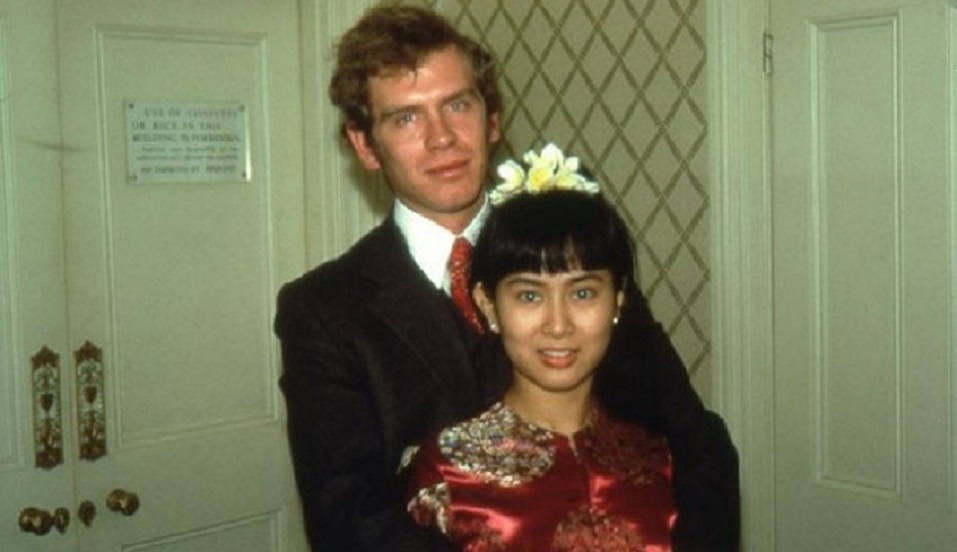
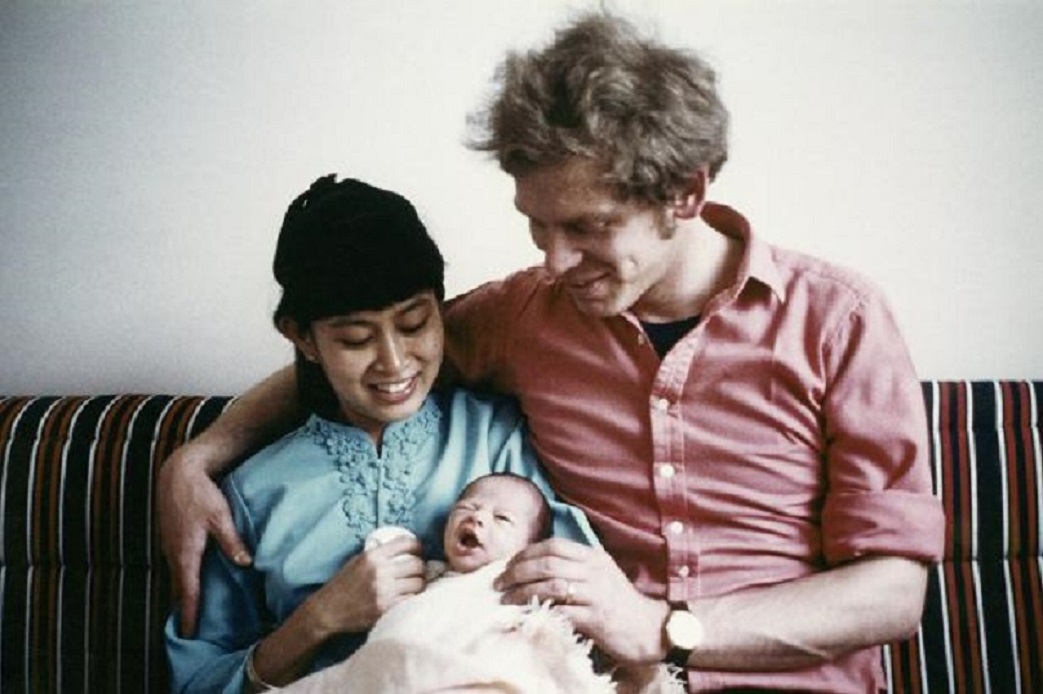 When I began to research a screenplay about Aung San Suu Kyi , I wasn’t expecting to uncover one of the great love stories of our time. Yet what emerged was a tale so romantic – and yet so heartbreaking – it sounded more like a pitch for a Hollywood weepie: an exquisitely beautiful but reserved girl from the East meets a handsome and passionate young man from the West.
When I began to research a screenplay about Aung San Suu Kyi , I wasn’t expecting to uncover one of the great love stories of our time. Yet what emerged was a tale so romantic – and yet so heartbreaking – it sounded more like a pitch for a Hollywood weepie: an exquisitely beautiful but reserved girl from the East meets a handsome and passionate young man from the West.New Year’s Day, 1972, Chelsea registry office in London. Aung San Suu Kyi and Michael Aris marry, aged 26 and 25 respectively , they both experienced the tranquil days at Oxford. Not long after, they gave birth to a son named Alexander. A few years later, the second child is born. In the next 15 years, Aung San Suu Kyi and her husband at home caring for children, they experienced the tranquil days, filled with happiness, until the news from Burma.On a hot August day in 1988, tens of thousands of people started to gather on the open ground west of Rangoon’s most famous landmark, the magnificent Shwedagon pagoda. Somerset Maugham compared the sight of the pagoda rising above the city, glistening with gold, to a “sudden hope in the dark night of the soul”.His description could equally well have fitted the brave woman in a longyi with an orchid in her hair whom the people were flocking to see. In Burma, Asia’s heart of darkness, she, too, stood as a beacon of hope.Eighteen hours later they were still coming. The crowd swelled to close to a million. Many had camped throughout the night, bringing bedding and food with them. There was a buzz of anticipation in the air. All wanted to see and listen to Aung San Suu Kyi.At the time they knew very little about this remarkable woman beyond her name. Now she is the most famous political prisoner since Nelson Mandela and a Nobel peace prize laureate for standing up to a “regime characterised by brutality”. Yesterday, unbowed and as demure as ever, she was freed from years of house detention.To the adoring crowds on that August day 22 years ago when her ordeal started, the name of Suu Kyi was very special. Her father, General Aung San, was Burma’s great national hero. The reason so many had camped out in the open all night was because they saw in the daughter of this most revered figure in modern Burmese history their greatest hope for change after years of tyranny.Suu Kyi was making a political speech for democracy and freedom at a critical juncture. Burma was in chaos after students had led a popular uprising against the military. Blood flowed in the streets from the crackdown that followed.General Ne Win, the ageing and hated dictator who had dominated Burma for three decades of economic stagnation and isolation, had resigned. His successor Sein Lwin, who had ordered troops to open fire on massed demonstrators demanding an end to military rule and the introduction of democracy, had also quit. It was hoped that the third president in a few weeks, Maung Maung, would make significant concessions. It turned out to be a vain hope. Burma is still in chains.Suu Kyi’s speech that day, though, was a defining moment in her life. It marked the instant when she turned her back on her comfortable life in Britain and returned to her roots.Asia has had its share of family dynasties. In India son followed mother, in Pakistan daughter followed father, in the Philippines widow followed husband. But nowhere has the idealism and sense of duty been as strong and principled as in the case of Suu Kyi, who that day took the heartbreaking decision to put her commitment to Burma above her family, a decision she has stuck with through thick and thin.Suu Kyi took the heartbreaking decision to put her commitment to Burma above her family, a decision she has stuck with through thick and thin. Until a few months before, she had been an Oxford housewife, living happily with her husband, the academic Michael Aris and their two children Alexander and Kim, in a smart townhouse near St Antony’s college. Now she was deliberately entering the brutal and devious world of Burmese politics. She has never emerged from it. Her lonely vigil, which began with her addressing the crowds that August day in 1988 challenging the generals, has continued unbroken to this day much of it under house arrest, and at a tragic personalcost. For as well as a political story, Suu Kyi’s is ultimately a family tragedy. She arrived at Oxford in 1964 to study philosophy, politics and economics at St Hugh’s, where her contemporaries remember her “absolutely delectable” beauty a flower always in her long dark hair and her innocence of the social and sexual Sixties revolution roiling around her.Aris met her at the university and courted her on a romantic holiday in Bhutan, where he was teaching. At their wedding, Kipling’s poem Mandalay was recited: “I’ve a neater, sweeter maiden in a cleaner, greener land! On the road to Mandalay...” Aris loved those words, which he believed perfectly described his wife.But he also once said: “Before we married... I promised my wife that I would never stand between her and her country. And I have never tried to deter her from fulfilling what she sees as her duty to her people. Any person knowing her dedication to duty as I do would realise that such an attempt is sure to fail. March 1988 her mother suffered a severe stroke in Rangoon and Suu Kyi went out to nurse her. Although her visit coincided with the greatest political upheaval for decades, she initially took no part in it. When protesters discovered Aung San’s daughter was in the city, they pleaded with her to become their leader; but she was reluctant.“She just wanted to help to stop the killing,” a former student activist told the BBC’s Mike Wooldridge recently. “She didn’t want to play any political role. I said: ‘You are General Aung San’s daughter. We really need you.’ So I persuaded her... was her sense of duty to the country where her father had died a hero that forced her to pick up the torch for freedom he had once carried and campaign against the generals.Aung San was assassinated in 1947 on the threshold of gaining independence for Burma from Britain. Aged two, his daughter was too young to have known him. But she cherishes the photograph she has of him holding her in his arms and, although she had left Burma at the age of 15, she was never allowed to forget she was his daughter.On that day in August 1988 beside the Shwedagon pagoda she told the adoring crowd that the political uprising was a “second struggle for national independence” and, as Aung San’s daughter, she could not remain indifferent.“It is true I have lived abroad,” she said. “It is also true that I am married to a foreigner. These facts have never, and will never, interfere with or lessen my love and devotion for my country by any measure or degree.”It was at that time that western journalists, including myself, who had smuggled themselves into Burma to cover the mass demonstrations against military rule, first met her.We did so at the family’s rambling colonial mansion at No 54 University Avenue, where she was nursing her ailing mother who would die soon afterwards.The impression of that first meeting has stayed with me. Her demure and willowy appearance masked a rock-solid will. None of us realised how strong it was, because she was always beguilingly gentle and soft-spoken even when she criticised the brutal generals.I noted that Suu Kyi was full of hope for her country. Wherever she appeared she was feted, and nothing seemed to intimidate her. Once, when soldiers took aim and warned they would shoot if she continued walking down the middle of a road, she kept on walking. It would be good to think that her 15 years under house arrest have had a positive influence on the way Burma is governed. It is a great personal triumph that she has stuck to it, an extraordinary feat of willpower. But her release follows fraudulent elections that resulted in a political party closely linked to the military regime winning most of the seats in parliament, so it is questionable whether she can achieve any lasting change in her country.
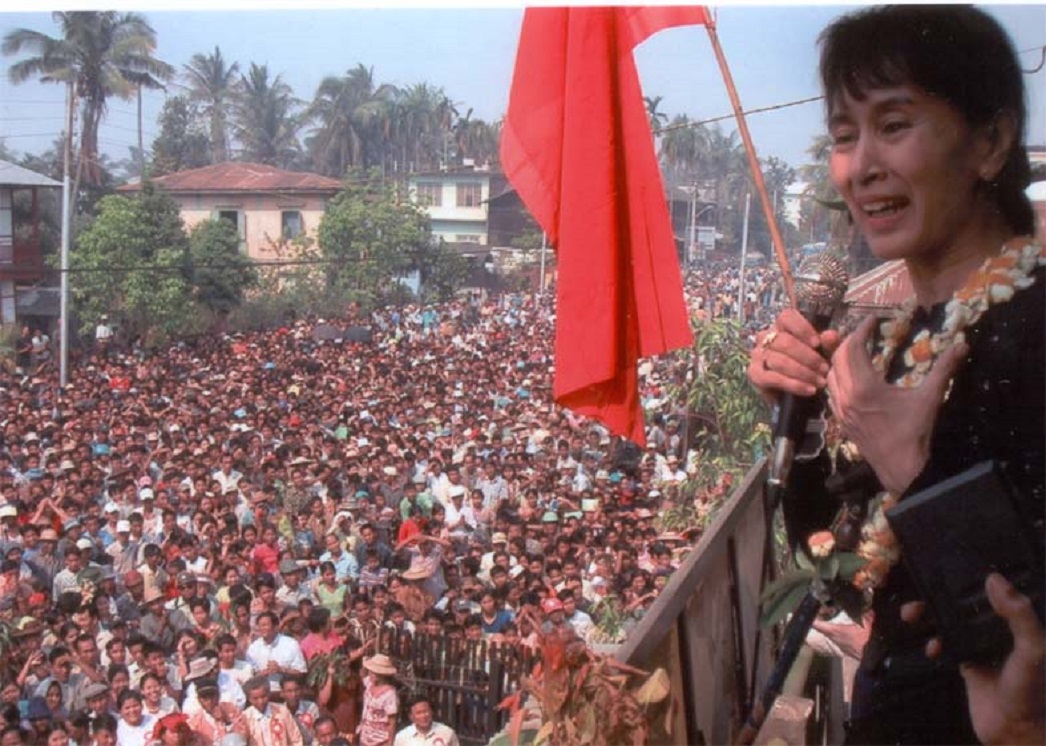
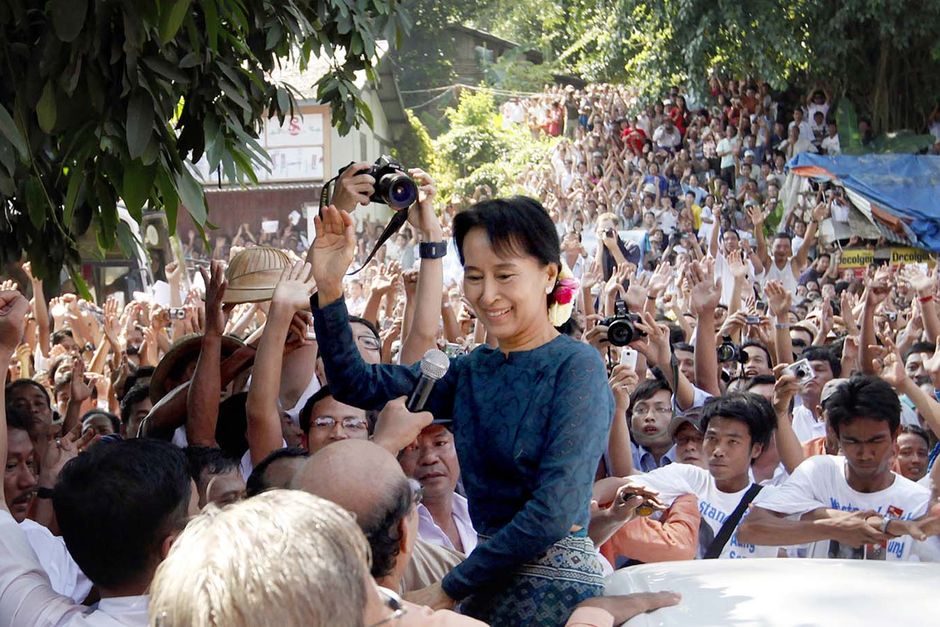 Myanmar opposition leader Aung San Suu Kyi greets supporters during a visit to her constituency on the occasion of festivities surrounding the country's new year in Kawhmu outside Yangon.Miss Suu Kyi campaigned in the Burma by-elections on a pledge to amend the country's new constitution which guarantees 25 per cent of all seats to the country's feared military. She has written to the President, former general Thein Sein, asking him to change the oath and replace it with a pledge to 'observe' the constitution instead.
Myanmar opposition leader Aung San Suu Kyi greets supporters during a visit to her constituency on the occasion of festivities surrounding the country's new year in Kawhmu outside Yangon.Miss Suu Kyi campaigned in the Burma by-elections on a pledge to amend the country's new constitution which guarantees 25 per cent of all seats to the country's feared military. She has written to the President, former general Thein Sein, asking him to change the oath and replace it with a pledge to 'observe' the constitution instead.In England, Michael could only anxiously monitor the news as Suu toured Burma, her popularity soaring, while the military harassed her every step and arrested and tortured many of her party members. He was haunted by the fear that she might be assassinated like her father. And when in 1989 she was placed under house arrest, his only comfort was that it at least might help keep her safe.Michael now reciprocated all those years Suu had devoted to him with a remarkable selflessness of his own, embarking on a high-level campaign to establish her as an international icon that the military would never dare harm. But he was careful to keep his work inconspicuous, because once she emerged as the leader of a new democracy movement, the military seized upon the fact that she was married to a foreigner as a basis for a series of savage – and often sexually crude – slanders in the Burmese press.For the next five years, as her boys were growing into young men, Suu was to remain under house arrest and kept in isolation. She sustained herself by learning how to meditate, reading widely on Buddhism and studying the writings of Mandela and Gandhi. Michael was allowed only two visits during that period. Yet this was a very particular kind of imprisonment, since at any time Suu could have asked to be driven to the airport and flown back to her family.But neither of them ever contemplated her doing such a thing. In fact, as a historian, even as Michael agonised and continued to pressurise politicians behind the scenes, he was aware she was part of history in the making. He kept on display the book she had been reading when she received the phone call summoning her to Burma. He decorated the walls with the certificates of the many prizes she had by now won, including the 1991 Nobel Peace Prize. And above his bed he hung a huge photograph of her.Inevitably, during the long periods when no communication was possible, he would fear Suu might be dead, and it was only the odd report from passers-by who heard the sound of her piano-playing drifting from the house that brought him peace of mind. But when the south-east Asian humidity eventually destroyed the piano, even this fragile reassurance was lost to him.Then, in 1995, Michael quite unexpectedly received a phone call from Suu. She was ringing from the British embassy, she said. She was free again! Michael and the boys were granted visas and flew to Burma. When Suu saw Kim, her younger son, she was astonished to see he had grown into a young man. She admitted she might have passed him in the street. But Suu had become a fully politicised woman whose years of isolation had given her a hardened resolve, and she was determined to remain in her country, even if the cost was further separation from her family.That 1995 visit was the last time Michael and Suu were ever allowed to see one another. Three years later, he learnt he had terminal cancer. He called Suu to break the bad news and immediately applied for a visa so that he could say goodbye in person. When his application was rejected, he made over 30 more as his strength rapidly dwindled. A number of eminent figures – among them the Pope and President Clinton – wrote letters of appeal, but all in vain. Finally, a military official came to see Suu. Of course she could say goodbye, he said, but to do so she would have to return to Oxford.The implicit choice that had haunted her throughout those 10 years of marital separation had now become an explicit ultimatum: your country or your family. She was distraught. If she left Burma, they both knew it would mean permanent exile – that everything they had jointly fought for would have been for nothing. Suu would call Michael from the British embassy when she could, and he was adamant that she was not even to consider it.When I met Michael’s twin brother, Anthony, he told me something he said he had never told anyone before. He said that once Suu realised she would never see Michael again, she put on a dress of his favourite colour, tied a rose in her hair, and went to the British embassy, where she recorded a farewell film for him in which she told him that his love for her had been her mainstay. The film was smuggled out, only to arrive two days after Michael died.
Myanmar's Aung San Suu Kyi arrives at her party headquarters after general elections in Yangon, Myanmar November 9, 2015.Myanmar's The party of Myanmar opposition leader Aung San Suu Kyi won all 12 of the parliamentary seats declared in the first round of results after Sunday's general election, according to the country's election commission.The 12 seats, all in the country's largest city, Yangon, went to the National League for Democracy (NLD), Union Election Commission Chairman Tin Aye told a news conference. Opposition Party Wins All 12 of First Seats Declared.
